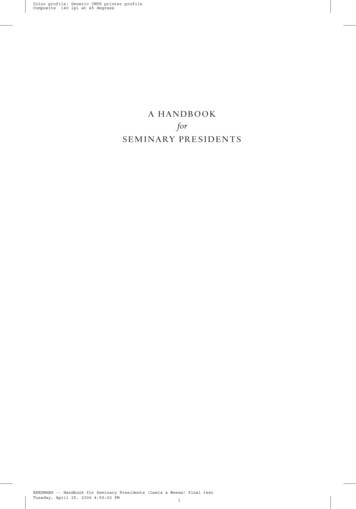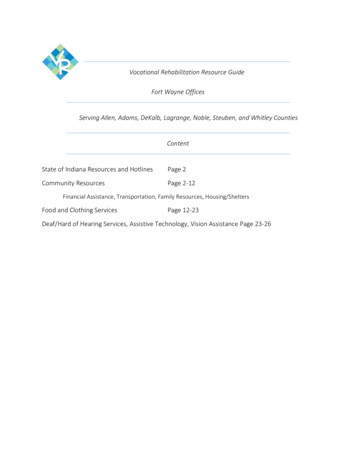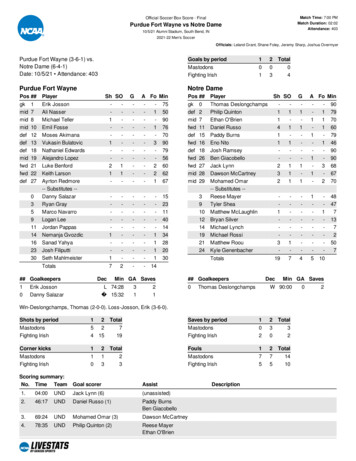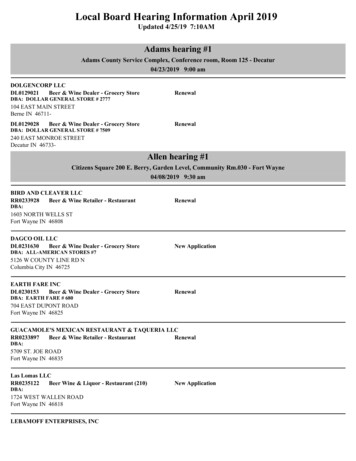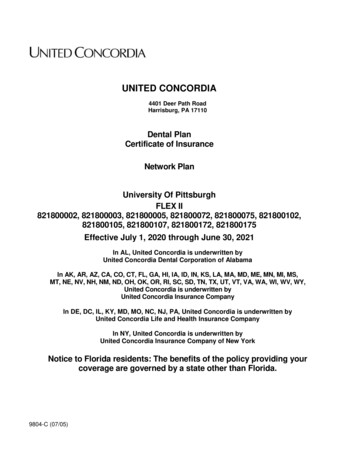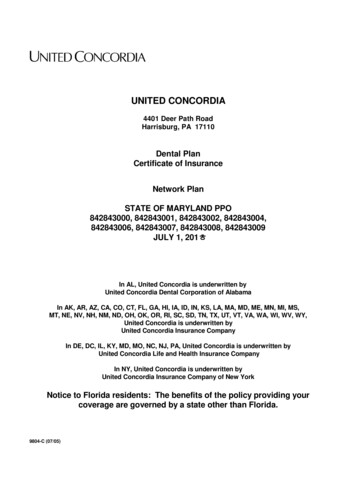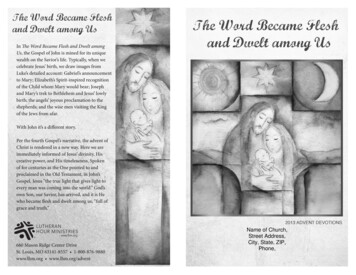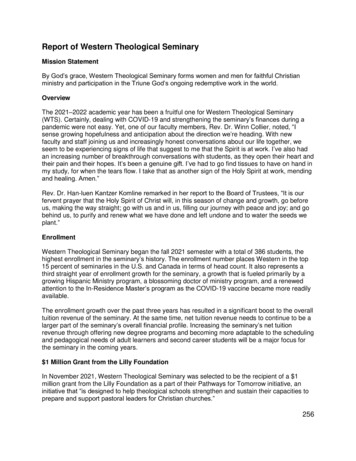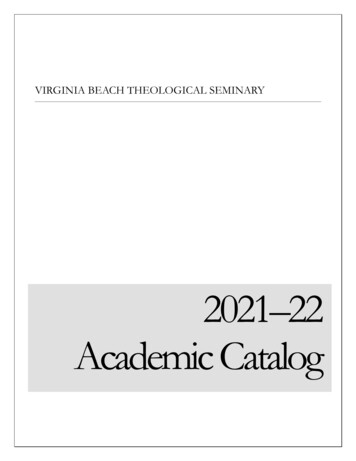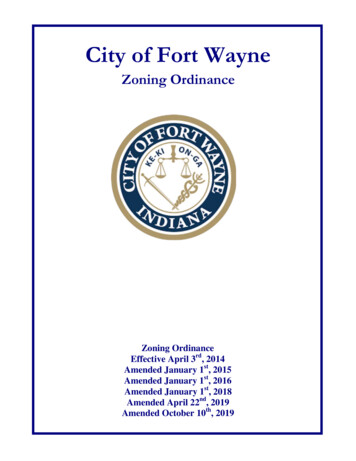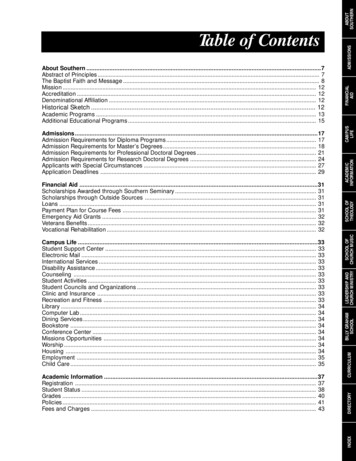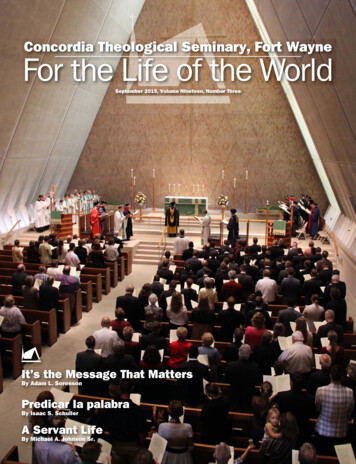
Transcription
Concordia Theological Seminary, Fort WayneFor the Life of the WorldSeptember 2015, Volume Nineteen, Number ThreeIt’s the Message That MattersBy Adam L. SorensonPredicar la palabraBy Isaac S. SchullerA Servant LifeByMichaelSeptember2015A. Johnson Sr.1
CONTENTSVolume Nineteen, Number ThreeF E A T U R E S4 It’s the Message That MattersBy Adam L. SorensonWe are not trying to implement a new model or programfor urban ministry. Rather, we simply strive to be faithful.To preach and teach the Word. To care for people in theirneeds with the love of Christ. Thus it is Christ and Hismeans of grace that are exceptional, not us.7 Predicar la palabraBy Isaac S. SchullerI am blessed with the opportunity to proclaim the mightyworks of God Sunday after Sunday in English and inSpanish, to predicar la palabra (preach the Word).Ministering to people in Spanish has been a greatprivilege. One of the greatest gifts I have received fromworking with people whose mother tongue is Spanish isto hear them ask the question “¿Qué significa esto?”10 A Servant LifeFor the Life of the WorldPUBLISHERDr. Lawrence R. Rast Jr.PresidentMANAGING EDITORJayne E. SheaferPRODUCTION COORDINATORColleen M. BartzschCOPY EDITORTrudy E. BehningART DIRECTORSteve J. BlakeyBy Michael A. Johnson Sr.In respect to serving in various ministries, locations maybe different, people may be different in age, race, creed,ethnicity and culture, yet all have the same eternal need,that of a Savior, namely, Jesus Christ. In receiving Him,pastors serve as Christ’s agents, standing in His steadand by His command to preach, teach and administer HisSacraments to the faithful.Also in this issue:What Does This Mean? . . . . . . . . . . . . . . . . .p. 13Called to Serve . . . . . . . . . . . . . . . . . . . . . . .p. 14Faculty Focus . . . . . . . . . . . . . . . . . . . . . . . . .p. 16CTSFW Begins 170th Academic Year . . . . . .p. 18For the Life of the World is published by Concordia Theological Seminary Press,6600 N. Clinton St., Fort Wayne, Indiana 46825. No portion of this publication maybe reproduced without the consent of the Managing Editor of For the Life of theWorld by email at SeminaryRelations@ctsfw.edu or 260-452-2250. Copyright 2015.Printed in the United States. Postage paid at Berne, Indiana.Faculty News . . . . . . . . . . . . . . . . . . . . . . . . .p. 21For the Life of the World is mailed to all pastors and congregations of The LutheranChurch—Missouri Synod in the United States and Canada and to anyone interestedin the work of Concordia Theological Seminary, Fort Wayne, Indiana.Bible Study . . . . . . . . . . . . . . . . . . . . . . . . . .p. 30Military Project . . . . . . . . . . . . . . . . . . . . . . .p. 27Profiles in Giving . . . . . . . . . . . . . . . . . . . . . .p. 28Calendar of Events . . . . . . . . . . . . . . . . . . . .p. 31Unless otherwise noted, all Scripture verses are from the English Standard Version(ESV).September 20153
Predicarla palabraPreachtheWordBy Isaac S. Schuller“¿Qué significa esto?”Translated in English: What does this mean? As Lutherans,this question is familiar to us. This question was asked bydevout Jews from every nation under heaven during the timeof Pentecost. These men were hearing the mighty works ofGod in their native tongue from Galileans.September 2015Christ is what we have in common.Christ did not shed His blood fora certain skin color or languagegroup, but He shed His blood forthe whole cosmos. It is an honor tobe asked questions about God andto be able to share the Word of Godin its truth and purity.77
It is exhilarating to show peoplethat you can ask questions. To showthem that in asking questions, theirfaith can be strengthened. TheBible is full of people who believedin Yahweh, and what did they do?They asked questions. There isan instant glow that comes whenpeople know that they can askquestions and not be reprimandedfor it. The Bible then becomes abook that no longer collects dustbut becomes read daily with notesand dog-eared pages.I am blessed with the opportunity toproclaim the mighty works of GodSunday after Sunday in English and inSpanish, to predicar la palabra (preachthe Word). Ministering to people inSpanish has been a great privilege. Oneof the greatest gifts I have receivedfrom working with people whosemother tongue is Spanish is to hearthem ask the question “¿Qué significaesto?” Many people who have Spanishas their first language are coming froma culture that holds the church in highesteem. The primary cultures at ourcongregation, First Immanuel/PrimeraEmanual, are Mexican and Nicaraguan.Soon after I started in the ministry,a young Hispanic woman came to mebecause she wanted to have her childbaptized. When I asked her why shewanted the child to be baptized, she said,“I don’t know it’s just something wedo.” I was shocked by her answer, but Ilearned that asking questions is almostseen as disrespecting the church and thatis the last thing one wants to do.It is exhilarating to show people thatyou can ask questions. To show themthat in asking questions, their faith canbe strengthened. The Bible is full ofpeople who believed in Yahweh, andwhat did they do? They asked questions.Of course, we ask with respect. There isan instant glow that comes when peopleknow that they can ask questions and not8be reprimanded for it. The Bible thenbecomes a book that no longer collectsdust but becomes read daily with notesand dog-eared pages. On a side note,writing in the Bible is also a no-no inmost Spanish speaking cultures because itis seen as disrespectful to the Holy Book.Tortas, enchiladas, mole, horchata,gorditas, tamales and the list couldgo on. What does all this mean? Foodis a big part of the Mexican culture.Members of the congregation want toinvite my wife and me over to theirhome when there is a birthday party intheir immediate family. Once you getto know their extended family, becauseeveryone comes to the party, they willthen invite you for one of their birthdaycelebrations. Eating with family isimportant. When I distribute the Lord’sbody and blood in Service, I can see bythe people’s faces how important themeal of the Lord is to them. They knowthat it is a foretaste of the feast to come.We have a food and clothingco-op on the church property that iscalled Community Outreach MinistryEndeavors. Many of the congregation’smembers volunteer there. Many peopleof different languages come through toreceive food. In fact, in the past, peoplewho received food were then connectedto members of the congregation andare now members of the congregationthemselves. This reminds me of Christfeeding the five thousand, but before Hedid, He taught them. We want to be ableto hand out bread and teach people aboutthe Bread of Life.At Primera Emanuel, our secondservice is conducted in the Spanishlanguage only, just as our first serviceis conducted only in English. In theSpanish service, we follow the liturgyfrom Cantad al Senor, which is theequivalent to Lutheran Worship. Thesongs we sing are from Cantad alSenor and Culto Cristano, which is theequivalent of The Lutheran Hymnal. Itwould be wonderful to have the LutheranService Book translated into Spanish.The brothers and I have been talkingabout possibly starting it ourselves.Congregations serving both Englishand Spanish languages could then moreeasily hold bilingual services as bothservices would be familiar with the sameliturgy. The liturgy could then be saidand sung together as one congregation.My wife, Liz, has immensely enjoyedbuilding relationships with people inboth services. At first, in the Spanishservice, she was shy and intimidatedbecause she did not know how to speakSpanish very well. Very quickly, thepeople eased her fears over her brokenSpanish by welcoming her with openarms. She was amazed and in awe of thefact that you can so easily share God’slove with others through non-verbalFor the Life of the World
Bilingual Pastoral Formationfor Latinos Offered at CTSFWAcommunication. After two years ofattending both services each week, shenow is able to speak and sing the liturgyin Spanish, and her communication skillsare improving weekly or poco a poco(little by little) as she likes to say.The congregation used to have onepastor for the English service and adifferent pastor for the Spanish service.My call has been to fulfill both positions.At first, it was difficult because there wasa mentality that the English service wasone congregation and the Spanish servicewas another congregation. I thought tomyself “¿Qué significa esto?” In the past,each language group would go to theirown pastor, and all of a sudden there wasonly one pastor, me. It reminded me thatChrist is our Good Shepherd. We mightlive in different parts of the world, lookdifferent and speak different languages,yet Christ is what we have in common.Christ did not shed His blood for acertain skin color or language group, butHe shed His blood for the whole cosmos.It is an honor to be asked questions aboutGod and to be able to share the Word ofGod in its truth and purity.ccording to recent projections from the U.S. CensusBureau, it is estimated that by 2060 those who identify asHispanic will be nearly 30% of the total U.S. population,numbering nearly 129 million people. In an effort to reachout and better serve that growing community, ConcordiaTheological Seminary (CTSFW), Fort Wayne, Indiana, isjoining in partnership with Concordia College, New York(CCNY), and the Atlantic, New Jersey and New EnglandDistricts of The Lutheran Church—Missouri Synod (LCMS)to offer Bilingual Pastoral Formation for Latinos (BPFL), aprogram leading to ordination into the Holy Ministry.The typical student will be a Latino who has a high school diploma(or equivalent) and is bilingual. The students are selected by the districtsthat are participating in the program and must receive a recommendationfrom their parish pastor. Upon completion of the program, graduateswill serve as pastors in the districts that supported them in the program.CTSFW, in partnership with Seminario Concordia in Buenos Aires,Argentina, developed a program for forming pastors in the Spanishspeaking world outside of the United States entitled Formación Pastoralpara Hispanoamérica (Pastoral Formation for Hispanic-America). TheBPFL curriculum is based on this curriculum, along with English lecturesand readings. It is a four year program of four, eight week courses per year.Courses are taught by distance learning with cohorts and mentor pastorswithin the districts.Those desiring more information on the program can go onforLatinosor connect with the Rev. Don C. Wiley, CTSFW assistant directorfor BPFL, at Don.Wiley@ctsfw.edu or 260-452-3203.The Rev. Isaac S. Schuller(CTSFW 2013) serves aspastor of First Immanel/PremeraEmanuel Lutheran Church(www.firstimmanuel.org),San Jose, California.Rev. Don C. Wiley, CTSFW assistant director forBPFL, with seminarian Santiago KeinbaumSeptember 20159
joining in partnership with Concordia College, New York (CCNY), and the Atlantic, New Jersey and New England Districts of The Lutheran Church—Missouri Synod (LCMS) to offer Bilingual Pastoral Formation for Latinos (BPFL), a program leading to ordination into the Holy Ministry. The typical student will be a Latino who has a high school diploma
